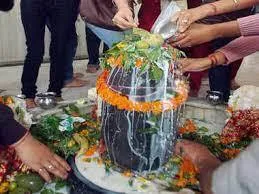The Spiritual Essence of Maha Shivratri: Celebrating the Divine Union
Image to Text Converter
Introduction:
Maha Shivratri, a sacred festival celebrated by millions around the world, holds profound significance in the Hindu calendar. Marking the convergence of devotion, spirituality, and tradition, Maha Shivratri honours Lord Shiva, the supreme deity of destruction and transformation. This auspicious occasion, observed with fervour and devotion, transcends boundaries, bringing people together in reverence and celebration.
The Origins of Maha Shivratri:
The roots of Maha Shivratri trace back to ancient scriptures and mythological tales. According to Hindu mythology, this divine festival commemorates the marriage of Lord Shiva with Goddess Parvati. It symbolizes the cosmic union of masculine and feminine energies, representing creation, preservation, and destruction—the cycle of life. Maha Shivratri, literally translating to "the Great Night of Shiva," is believed to be the night when Lord Shiva performed the heavenly dance of creation and destruction, known as the Tandava.
The Spiritual Significance:
Maha Shivratri holds deep spiritual significance for devotees, symbolizing the triumph of light over darkness and knowledge over ignorance. It is believed that observing fasts, meditating, and chanting the sacred mantras of Lord Shiva on this auspicious day purifies the soul and brings blessings for spiritual growth. Devotees seek Lord Shiva's grace to overcome obstacles, attain inner peace, and embark on the path of self-realization. The divine vibrations of Maha Shivratri resonate throughout the universe, fostering spiritual awakening and divine communion.
Traditions and Rituals:
The observance of Maha Shivratri is marked by various traditions and rituals that vary across regions and communities. Devotees undertake rigorous fasts, abstaining from food and water, to demonstrate their dedication and devotion to Lord Shiva. They visit temples, perform elaborate puja ceremonies, and offer sacred items like Bilva leaves, milk, and fruits to the deity. Throughout the night, devotional songs, hymns, and chants echo in temples, creating an atmosphere charged with spiritual fervour. The night-long vigil, known as "Jagaran," is a common practice where devotees engage in prayers, meditation, and recitation of Shiva's name.
Celebrations Around the World:
Maha Shivratri transcends geographical boundaries, uniting devotees from diverse cultures and backgrounds in celebration. In India, cities like Varanasi, Haridwar, and Ujjain witness grand festivities with processions, cultural performances, and religious rituals. In Nepal, the Pashupatinath Temple becomes the focal point of celebrations, attracting thousands of devotees seeking Lord Shiva's blessings. Beyond the Indian subcontinent, countries like Mauritius, Indonesia, and the United Kingdom host vibrant Maha Shivratri events, highlighting the global appeal and significance of this sacred festival.
Symbolism and Spiritual Practices:
The symbolism embedded in Maha Shivratri resonates deeply with spiritual seekers, offering profound insights into life's mysteries. The divine union of Shiva and Parvati represents the harmonious balance between masculine and feminine energies within oneself. It teaches the importance of embracing both aspects to achieve wholeness and enlightenment. Through meditation, introspection, and self-discipline, devotees aspire to awaken their inner Shiva—the divine consciousness residing within every being. Maha Shivratri serves as a reminder to transcend worldly attachments and connect with the eternal essence of existence.
The Essence of Devotion:
At the heart of Maha Shivratri lies unwavering devotion and surrender to the divine. Devotees immerse themselves in prayer and contemplation, seeking solace and guidance from Lord Shiva. The act of fasting and abstaining from worldly pleasures symbolizes detachment from material desires and a deep yearning for spiritual fulfilment. Through acts of service, charity, and selflessness, devotees express their love and reverence for the divine, embodying the essence of devotion in its purest form.
Maha Shivratri, with its rich symbolism and spiritual practices, serves as a beacon of light illuminating the path towards self-realization and transcendence. As devotees gather to celebrate the divine union of Shiva and Parvati, they are reminded of the eternal truths embedded in Hindu philosophy—the cyclical nature of existence, the pursuit of inner harmony, and the ultimate goal of attaining liberation. May Maha Shivratri inspire us all to embark on a journey of spiritual awakening and divine transformation, leading us closer to the eternal bliss of union with the divine.

